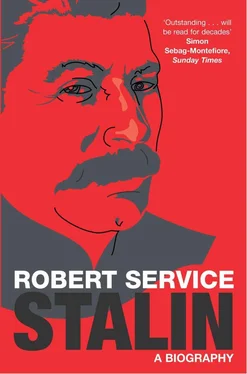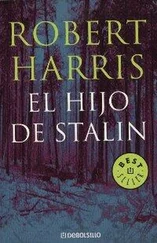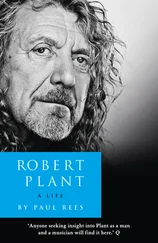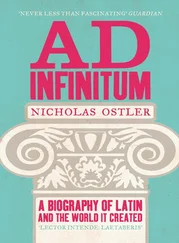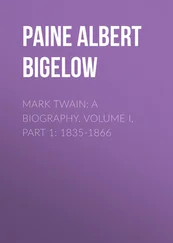Holy Scripture 5
Russian literature 5
Secular history 5
Mathematics 5
Georgian language 5
Latin –
Greek 4
Church-Slavonic singing 5
Georgian-Imeretian singing 5
His Gori schooling had left him weaker in Greek than in other subjects (and perhaps his late entrance to the Seminary precluded him from starting Latin).
The later years of the Seminary curriculum increased its emphasis on the Christian faith and on practical preparation for the priesthood. In the sixth year Joseph Dzhughashvili had only one weekly period of Greek and no Russian secular literature or history nor any science or mathematics. The gap was filled by ecclesiastical history, liturgy, homiletics, dogma, comparative theology, moral theology, practical pastoral work, didactics and, as before, Holy Scripture and church singing. 12The curriculum irked the young seminarists. All the allowable works of Russian literature predated Alexander Pushkin. Other banned classics were the novels of Lev Tolstoi, Fëdor Dostoevski and Ivan Turgenev. Georgian poetry and prose were proscribed. Even Shota Rustaveli, the thirteenth-century poet, was prohibited. 13National sensitivities and cultural aspirations were affronted by the curriculum and rules of the Tiflis Spiritual Seminary, and the Rector had no answer other than to reinforce his reliance on surveillance and punishment. As Joseph Dzhughashvili progressed from year to year, his sympathies moved towards those who kicked against the regulations. Intelligent and patriotic, he refused to accept the conditions. Secretly he talked to seminarists who felt the same. Whenever they could, they undermined the imposed regime.
Joseph’s personal development had a long tradition. Within a few years of its foundation the Seminary had given trouble to the authorities. Rebelliousness was constant. Silva Dzhibladze, a future Marxist, was expelled in 1884 for physically assaulting the Rector. Two years later a certain Largiashvili, a seminarist from Gori, went a step further and stabbed the Rector to death. 14During Lent in 1890, while Joseph Dzhughashvili was still at the Gori Spiritual School, the Tbilisi seminarists went on strike. Bored by the endless meals of beans, they refused to attend lessons unless the diet was changed. Among the strike leaders were Noe Zhordania and Pilipe Makharadze. 15Zhordania was to become the leader of Georgian Menshevism and Makharadze a leading Georgian Bolshevik. Their demands were expanded to include teaching in the Georgian language and courses in Georgian history and literature. The boycott of classes went on for a week and Zhordania and Makharadze produced a handwritten journal to agitate for sustained support. 16Another food strike broke out in 1893 and led to the expulsion of Akaki Chkhenkeli, Vladimir Ketskhoveli and Severian Dzhugheli. They all became famous as Marxists. Mikha Tskhakaya and Isidore Ramishvili also entered the Marxist movement after leaving the Seminary. 17
The Russian Orthodox Church had become the finest recruiting agency for the revolutionary organisations. Each year the specific complaints of the seminarists were the same: the restricted curriculum, the denigration of Georgian culture, the harsh discipline and the grim meals at Lententide. The antagonism of the priests to all things secular, national and modern was simply counter-productive. Rector Germogen and Inspector Abashidze did Karl Marx’s work for him.
There was no strike in Joseph’s time at the Seminary. But resistance to the rules was systematic and he was quick to join the rebels. Their minds thirsted for intellectual nourishment beyond the menu of the official curriculum. Out and about in the city they found what they wanted. Seminarists feared denunciation if they borrowed disapproved books from the nearby Public Library. Instead they sought out the Iveria and Kvali editorial offices and Zakaria Chichinadze’s bookshop. There they could read and talk about things banned by the priests. Iveria was edited by the poet and commentator Ilya Chavchavadze. While calling for Georgian cultural freedom, Chavchavadze eschewed anything but the mildest demands for social and economic reform. Giorgi Tsereteli’s Kvali was more radical. Coming out every Saturday, it attracted contributions from critical intellectuals across a wide range which included both agrarian socialists and Marxists (and in January 1898 Tsereteli handed over the editorship lock, stock and barrel to Noe Zhordania without any political conditions). 18Zakaria Chichinadze was a socialist sympathiser. Chavchavadze, Tsereteli and Chichinadze had many disagreements while concurring on the need for some reform and for Georgians to struggle to that end. They understood that the key to success lay in their campaign to win the hearts and minds of youths like Joseph.
As editors and publishers they were very enterprising. The Imperial censorship was a patchy phenomenon. Tight and intrusive in St Petersburg, it was slacker in Georgia and Finland. The harsh control over ideas in the Seminary was not replicated outside its walls. Although overtly nationalist works were picked out for attention, pieces on social, economic and historical themes were permitted to appear. Before the turn of the century, moreover, the chief perceived danger to the Romanovs was thought to come from those intellectuals who called for armed struggle, regional autonomy or even secession from the Russian Empire. Chavchavadze offered no direct challenge to the monarchy or the social order. But the Marxists too were deemed to be not unduly menacing since they appeared to be preoccupied with social and economic grievances; none of them demanded Georgian territorial autonomy, far less independence. The chief censor in Tbilisi, Giorgi Zhiruli, cheerfully admitted to his ignorance of Marxism. In such an environment it was possible to have a lively public debate. Marxists in Russia had to content themselves with thick journals published in St Petersburg and with intermittently appearing émigré newspapers. 19The debate for the soul of the Georgian nation was intense as conservatives, liberals and socialists contended with each other.
Joseph Dzhughashvili was more confident than most first-year seminarists. He had begun to write his own verses, and quickly after arriving in Tbilisi he set about trying to get them published. His themes were nature, land and patriotism. Ilya Chavchavadze appreciated his talent. Joseph’s first printed poem, ‘To the Moon’, appeared in the magazine Iveria in June 1895. Giorgi Tsereteli’s Kvali was no less enthusiastic about his work, and Joseph — writing under pseudonyms such ‘I. Dzh-shvili’ and ‘Soselo’ to avoid detection by the Rector and the Inspector — had six poems published in 1895–6. 20
The poem ‘Morning’ was a touching work written in the romantic literary style then conventional in Georgian literary circles: 21
The pinkish bud has opened,
Rushing to the pale-blue violet
And, stirred by a light breeze,
The lily of the valley has bent over the grass.
The lark has sung in the dark blue,
Flying higher than the clouds,
And the sweet-sounding nightingale
Has sung a song to children from the bushes
Flower, oh my Georgia!
Let peace reign in my native land!
And may you, friends, make renowned
Our Motherland by study!
Nobody would claim that this in translation is high art; but in the Georgian original it has a linguistic purity recognised by all. The themes of nature and nation commended themselves to readers. The educationist Yakob Gogebashvili, who had contacts with revolutionaries in Tbilisi, 22valued the poem so highly that he included it in the later editions of his school textbook, Mother Tongue ( deda ena ). 23
Читать дальше
